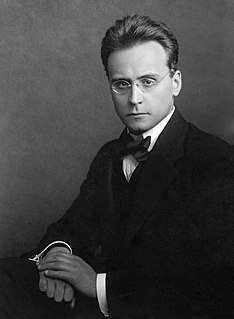Top 17 Quotes & Sayings by Anton Webern
Explore popular quotes and sayings by an Austrian composer Anton Webern.
Last updated on April 14, 2025.
The time was simply ripe for the disappearance of tonality. Naturally this was a fierce struggle; inhibitions of the most frightful kind had to be overcome, the panic fear, 'Is that possible, then?' So it came about that gradually a piece was written, firmly and consciously, that wasn't in a definite key any more.
Unity is surely the indispensable thing if meaning is to exist. Unity, to be very general, is the establishment of the utmost relatedness between all component parts... the aim is to make as clear as possible the relationships between the parts of the unity; in short, to show how one thing leads to another.
[the impression of the first time I heard Webern's music in a concert performance] was the same as I was to experience a few years later when I first laid eyes on a Mondriaan canvas...: those things, of which I had acquired an extremely intimate knowledge, came across as crude and unfinished when seen in reality
























